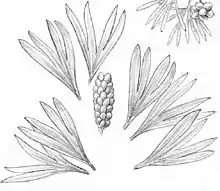| Karkeniaceae Temporal range: | |
|---|---|
 | |
| Leaves and seeds of Karkenia henanensis (centre) with Yimaia recurva (top right) | |
| Scientific classification | |
| Kingdom: | Plantae |
| Clade: | Tracheophytes |
| Clade: | Gymnospermae |
| Division: | Ginkgophyta |
| Class: | Ginkgoopsida |
| Order: | Ginkgoales |
| Family: | †Karkeniaceae Krassilov, 1972 |
| Genera | |
|
Karkenia Archangelsky, 1965 | |
Karkeniaceae is an extinct family in the order Ginkgoales. It contains the single genus Karkenia. It is distinguished by "Ovulate organs consisting of a peduncle and helically arranged, up to about 100 small, orthotropous but incurved ovules; pedicel present; nucellus largely free." Unlike other ginkgoales, the seeds are borne on cone-like aggregations. Ovuluate organs of Karkenia are associated with leaves of the Ginkgoites, Sphenobaiera and Eretmophyllum types. It is known from the Hettangian to Aptian of both Hemispheres.[1]
References
- ↑ Zhou, Zhi-Yan (March 2009). "An overview of fossil Ginkgoales". Palaeoworld. 18 (1): 1–22. doi:10.1016/j.palwor.2009.01.001.
This article is issued from Wikipedia. The text is licensed under Creative Commons - Attribution - Sharealike. Additional terms may apply for the media files.